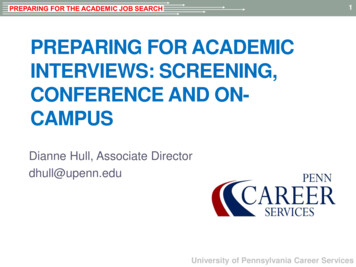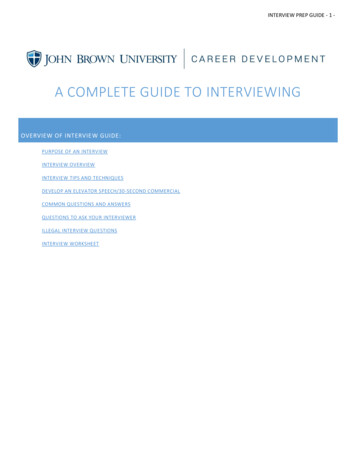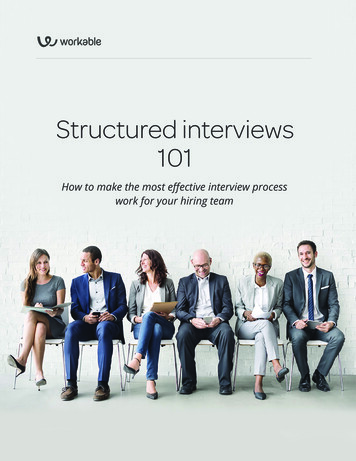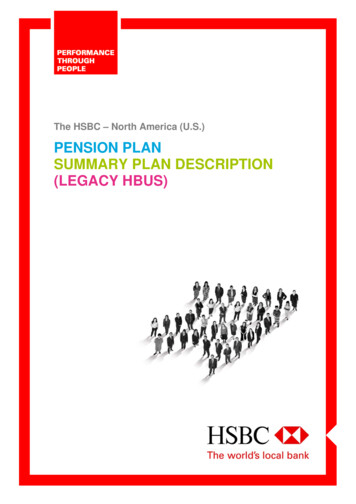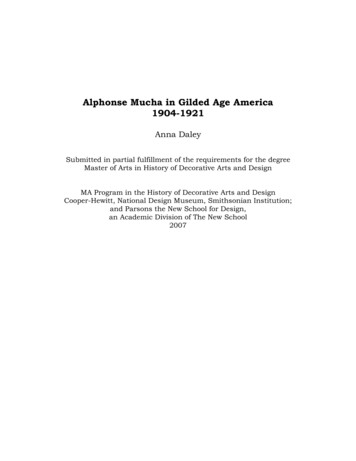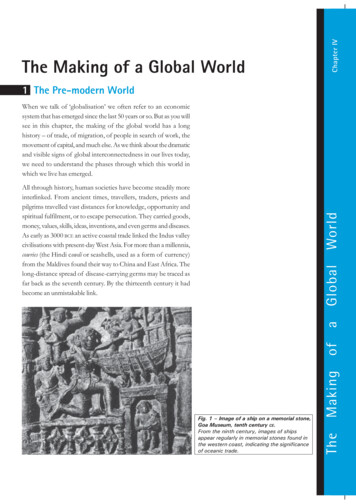
Transcription
Interviews with America'sTop Stock TradersJack D. SchwagerHarperBusinessAn Imprint of HarperCollinsPwWuAm
While the methods of investment described in this book are believed to be effectivethere is no guarantee that the methods will be profitable in specific applications, owingto the risk that is involved in investing of almost any kind. Moreover, readers arespecifically advised that the author may invest in certain of the traders about which he iswriting (or has written) and/or may be affiliated with hedge fund(s) that so invest withsuch persons or entities. Neither the publisher nor the author assumes liability for anylosses that may be sustained by the use of the method described in this book, and/orthis potential conflict of interest, and any such liability is hereby expressly disclaimed.STOCK MARKET WIZARDS. Copyright 2001 by Jack D. Schwager.All rights reserved. Printed in the United States of America.No part of this book may be used or reproduced in any manner whatsoeverwithout written permission except in the case of brief quotations embodied in criticalarticles and reviews. For information address HarperCollins Publishers, Inc.,10 East 53rd Street, New York, NY 10022.HarperCollins books may be purchased for educational, business, or salespromotional use. For information please write: Special Markets Department,HarperCollins Publishers, Inc., 10 East 53rd Street, New York, NY 10022.FIRST EDITIONDesigned lay Fearn CutlerLibrary of Congress Cataloging-in-Publication DataSchwager, Jack D., 1948Stock market wizards : interviews with America's top stock traders / by Jack D.Schwager.p.cm.ISBN 0-06-662058-91. Stockbrokers—United States—Interviews. 2. Investment advisors—UnitedStates—Interviews. 3. Floor traders (Finance)—United States—Interviews.4. Futures market—United States. 5. Financial futures—United States. I. Title.HG4621 .S2862001337. 64'0973—dc2100-058154In memory of my mother, Margaret Schwager, loved by allwho knew her for her kindness, empathy, and sincerity.andIn memory of my brother, Kerwin Farkas, deeply loved byfamily and many friends whose support never waneda reflection of a life well lived.
CONTENTSAcknowledgments «Prologue: An Inauspicious Beginning \iStuart Walton: " Back from the AbyssMichael Lauer: The Wisdom of Value, the Folly of Fad30Steve Watson: Dialing for Dollars54Dana Galante: Against the Current75Mark D. Cook: « Harvesting S&P Profits95Alphonse "Buddy" Fletcher Jr.: Win-Win Investing127Ahmet Okumus:* Frow Istanbul to Wall Street Bull148Mark Minervini: Stock Around the Clock169
Steve Lescarbeau:h- The Ultimate Trading System]89ACKNOWLEDGMENTSMichael Masters:* Swimming Through the Markets207John Bender:!* Questioning the Obvious22JClaudio Guazzoni:t- Eliminating the Downside239David Shaw:]» The Quantitative Edge254Steve Cohen:DO The Trading Room / »; t275Ari Kiev, M.D.: The Mind of a Winner288Wizard Lessons298Appendix: Options—Understanding the Basics327Index33JAlthough I found most of the traders in this book through personal contactsin the industry, several money manager databases and texts providedhelpful references. In particular, I would cite the following:Barclay MAP for Windows. This software program, which is updatedmonthly, allows searches of an impressively large database of hedgefund managers. The program is highly intuitive and permits the investor to extract and rank those trading programs that meet multipleuser-defined criteria. (Barclay Trading Group: [641] 472-3456; www.barclaygrp.com.)Van Hedge Fund Advisors International Inc. (VAN). A hedge fundadvisory service that compiles its own hedge fund indexes and maintains one of the largest hedge fund databases. The company providedme with the results of a computer search of hedge fund managers meeting my extremely restrictive set of criteria. ([615] 661-4748; www.hedgefund .com.)The CTA Report. A quarterly comprehensive compendium of CTAperformance results, containing a well-designed two-page layout of tablesand charts for each CTA. There is also an easy-to-use Web site formonthly updates. As the name implies, this service covers managers whospecialize in futures trading; only a small portion of these managers focuson equity derivatives. (International Traders Research, Inc.: [858] 4590818; www. managedfutures. com.)The U.S. Offshore Funds Directory. An annual publication that con-
ACKN01IMtains one-page summaries and annual returns for over 700 offshorehedge funds. There is also a web link for updates. ([212] 371-5935; www.hedgefundnews .com)When I began my search for traders worthy of inclusion in this volume, my first call was to Doug Makepeace. He has built a career on finding and investing his own and client funds with exceptional traders. Dougwas most generous in sharing information with me, even though doing sothreatened his ability to invest additional funds with these traders in thefuture if they became too well known.Tom DeMark, a renowned technical analyst whose indicators are featured on many of the country's leading financial data services, was particularly vigorous in his efforts to help me find traders for this book. Tom isin a good position to provide such assistance, holding the unofficial worldrecord as the technical analyst who has worked for the most (four) Market Wizards or their organizations.Marty Schwartz and Linda Raschke were two former Market Wizards("former" referring to the books in which their interviews appeared, nottheir trading talent) who helped me find new Market Wizards for thisbook.Other industry contacts who were particularly helpful in aiding mysearch for great trading talent include: Sol Waksman and George Van; BobMorris, Andy Good, Tony Cimirusti, Loran Fleckenstein, and Jason Perl.I find it extremely difficult to evaluate the writing quality of any bookI am working on. I lose all sense of perspective. For this reason, it isinvaluable to have someone to provide objective feedback as the book isbeing written. Enter my wife, Jo Ann, who read the final draft of eachchapter as soon as it was completed. Her promptness in performing thistask was not a reflection of her eagerness to read the material—in fact,few topics interest her less than the financial markets—but rather a resignation to the inevitable in the face of my unrelenting nagging. ("Haveyou read it yet?") Jo Ann provided honest comments—sometimes brutallyso—and very helpful suggestions, nearly all of which were accepted.Whatever the defects of this book in its final form, I can only assure thereader they would have been that much worse without Jo Ann's input.PROLOGUEAn Inauspicious BeginningMen are from Mars because they missed the flight to Venus. When to leavefor the airport has always been a subject that my wife and I have viewedfrom different perspectives—my view: late enough to make it exciting;my wife's view: early enough to allow for a traffic jam, a flat tire, airportshopping, and a full course meal before the flight.For years I left for airports without allowing for any spare time andnever missed a flight. About eighteen months ago, I moved to Martha'sVineyard, where the travel time to the airport can be accurately estimatedbecause of the limited traffic off-season and because the airport is sosmall—sort of like the one in the one in the old TV series Wings, onlysmaller. (At least it was when I began this book; a new airport has sinceopened.)One morning, only a few months after we had moved to Martha'sVineyard, my wife, Jo Ann, and I were scheduled to fly to Boston. I was sococky about the predictability of getting to the airport on time that I leftour house—approximately a twenty-minute drive away—only thirty-fiveminutes before the scheduled departure time. The drive took a few minutes longer than expected, due to being stuck behind a slow driver on theno-passing, single-lane road; I realized I had cut it just a little bit tootight."We'll still make it," I assured my wife, "but we won't have much extratime." She seemed skeptical—irrationally so, I thought. We pulled intothe airport entrance only ten minutes before flight time. Even though theparking lot was only a stone's throw from the terminal, I dropped Jo Annat the entrance, saying, "Let them know we're here."XI
AN I N A U S P I C I O U S BEGINNINGWhen I returned about one minute later, I found Jo Ann standing outside waiting for me with a troubled expression. Confused to see herthere, I asked, "What's wrong?""The plane left," she said in a voice that was a cross between disappointment and "I told you so.""What do you mean, the plane left?" I asked, glancing at my watch,even though I knew the exact time. "It's only eight minutes to ten."I went into the terminal, angry that the small prop plane had left without us before the scheduled time. "I don't get it," I said to the woman atthe airline counter, all prepared to be the aggrieved customer.She couldn't have been nicer. "Our planes leave as soon as everyone ishere. Since we hadn't heard from you to tell us you were running late, weassumed you weren't coming. If you had called, we would have held theplane." And, you know, they would have, too; that's how Martha's Vineyard works. How could I be angry at anyone other than myself after thatexplanation?Fast-forward about six months—the beginning of the interviewprocess for this book. I am scheduled to catch the first flight on an intricate itinerary that will take me to four states in four days for six interviews. This schedule has no leeway for missed flights.Wiser from experience, I make sure to leave early for the airport,allowing for plenty of extra time. On the drive there, Jo Ann, who is dropping me off, notices that I have lint on my blue blazer. She offers thehelpful hint that I should ask the people at the airport counter for tape tobrush it off. We arrive about thirty minutes early. I pull up to the curb andsay good-bye to Jo Ann. After checking in and sitting for a while, I realize1 have enough time to take care of my lint-laden jacket. I walk up to thecounter and obtain the necessary tape.There are about a dozen people in the small waiting room. A fewmoments later there is an announcement for my flight: "Now boardingsection one, seats one to eight." I pull out the red, plastic, envelope-sizeboarding pass and notice that it is emblazoned with the number 11."How quaint," I muse, "that they would board such a small flight in twosections." I sit down and return to my lint-removal project.I'm sitting there absentmindedly, picking lint off my jacket. SuddenlyI snap back into reality. I realize that it must be at least five or ten minutes since they called for the boarding of the first group of passengers. Ilook around the waiting area and, to my horror, I discover that it is virtually deserted. I jump up, run through the doors to the airstrip, and see asmall plane with propellers whirring. "Wait!" I yell, waving my arms frantically as I rush toward the plane. I see my whole precisely orchestratedtrip—all four days, four states, and six interviews of it—unraveling onthe spot.The airline attendant intercepts me. I flash my large red boardingpass. "You're not going anywhere," he says firmly. At first I think he meansthat it's too late and I missed the plane. But then he adds, "Your sectionwill be leaving in five minutes." That's when I learned that at theMartha's Vineyard airport "sections" refer to different planes!I slink back to my seat. The moment of panic having passed, my senseof awareness returns, and I am able to appreciate completely the fullscope of my stupidity. The last time I felt that embarrassed I had justasked an infrequently seen relative when she was "expecting," only tolearn subsequently that she had given birth two months earlier but hadobviously retained a good portion of the gained weight. Oops."Okay, okay," you're saying, "a slightly amusing anecdote—maybe—but what does this have to do with trading or investing?" Simply this: Ifyou're too busy picking the lint off your jacket, you're liable to miss theplane. In other words, don't get so caught up in the details that you missthe big picture. Here are some examples of market myopia: a trader who does exhaustive research trying to identify the mostpromising new technology companies but overlooks the fact that a 70percent price rise in the sector during the past six months implies anunusually high-risk investment environment a trader who scrutinizes a company's financial statements and reportsbut fails to realize that the company's soaring profits have been due toa single product whose future sales are threatened by the imminententry of new competitorsK a trader who is engrossed with finding better timing-entry methodsbut virtually ignores such critical questions as: When and how willpositions be exited? How will risk be controlled?
All of these examples contain the same basic message: Maintain awhole-picture perspective. Focus on the entire market and the sector, notjust the individual stock. Be attentive to qualitative factors, not just theavailable quantitative information. Develop a trading plan that encompasses all the aspects of trading, not just the entry strategy.STUART WALTONBack from the AbyssIn June 1999, at the peak Of his career, after eight years establishing one of the.most extraordinary stock trading track records of the 1990s, and with 150 million under management, Stuart Walton returned all money tohis investors and walked away from trading completely. The emotionalrepercussions of a marital breakup were interfering with his ability tofocus on trading, and he did not feel it was right to manage money untilhe could once again devote "100 percent energy and enthusiasm" to thetask. In the preceding eight years, he had achieved an astounding 115percent average annual compounded return in trading profits (92 percentfor his clients after deducting management fees), with annual returnsranging from a high of 274 percent to a low of 63 percent (excluding the1999 partial year).Stuart Walton's career as a trader is marked by a string of contradictions and paradoxes. He wanted to be an artist or a writer; he became atrader. Though he valued academics and disdained the financial world,the markets became his profession. He once hated trading so much thathe awoke feeling that he couldn't do it for another day and quit his jobthat morning; several years later, the markets were his endeavor and passion. His initial forays into stock trading were marked by such ineptitudethat he nearly went bankrupt, yet he subsequently became so skilled thathe more than doubled his money annually.I visited Walton, a Canadian expatriate, at his office in downtown SanFrancisco. I discovered that, although managing a nine-digit sum, he hadno trading assistants, no back office staff, no marketing people, no programmers, not even a full-time secretary. His firm, Reindeer Capital,
BACK FROM T H F A B Y S Sconsisted of Stuart Walton alone. His isolation was deliberate. After having gone wrong so often by listening to tips and opinions, he had come torealize the importance of not being influenced by others while trading.Walton was relaxed and outgoing. We talked for five hours straightwithout interruption. The time passed quickly.Is there some principle you wish to symbolize by the name, or isit just a matter of honoring your great-grandfather?I tell people that my great-grandfather added more value to societythan I ever will.When did you first get involved in the markets?As soon as I graduated from McGill University with an M.B.A. I originally wanted to be a cartoonist.Is there some significance to the name of the firm or are you justpartial to reindeer?The firm is named after my great-grandfather, William GladstoneWalton, who was given the nickname "Reindeer" for a famous trek heconceived and led. Much of what I know about him I learned frommy grandfather, who passed away last year at the age of one hundred,narrowly missing the feat of having lived in three separate centuries.In 1892, at the age of twenty-three, Reindeer Walton lelt England towork as a missionary in northern Canada. He typically traveled overtwo thousand miles a year by canoe and dogsled, visiting his far-flungconstituency—the Indians and Eskimos that lived around the ArcticCircle.One year, vast forest fires swept through northern Quebec,destroying almost all the region's vegetation and game, and leavingthe native population at the brink of starvation. Reindeer Waltoncame up with the idea of herding the Siberian reindeer, which arealso called caribou, from Alaska to northern Quebec. Through sheerperseverance, he convinced the Canadian government to finance thetrek, which he organized and led. It took him five years, from 1921 to1925, to herd three thousand reindeer across northern Canada. Reindeer are not like cattle; they move only when they want to move, andthey go in all different directions.How did he keep them herded together?Caribou will follow the feeding path. He used a lot of foresight inchoosing the right route. He succeeded in getting three-quarters ofthe herd to migrate; the remainder died or dispersed. His trek permanently changed the migration patterns for Siberian reindeer. The portion of the herd that survived flourished in northern Quebec, and hebecame a local hero.A cartoonist with an M.B.A.? Were you planning to be theworld's first business cartoonist?No, the cartoonist ambitions came earlier. When I graduated fromcollege, I definitely wanted to be a cartoonist. 1 sat down with thehead of the art department, and he told me, "If you feel you knowhow to draw and represent the human body as well as one of the masters of art history and are then prepared to make five dollars per hourdrawing cartoons, then this is definitely the career path for you." Hiscomments threw some cold water on my plans. I had also done somewriting in college, and a few of my short stories had been published. Ithought that journalism might be a good alternative career path thatallowed some creativity.Your interests seem to be so strongly artistic. Why did you go foran M.B.A.?Because the journalism idea fell through as well, and I decided Ineeded to earn a living.What went wrong with journalism?I applied to several journalism schools. That summer, while visitingmy parents, who were in Brazil at the time, I received a rejection callfrom Carleton University, which was my first choice for a journalismschool. I received the call during a party. Maybe it was because I'dhad too many Brazilian caipirinhas, which is their rum concoction,but I said to myself, "I guess this is another one of life's crossroads."So I decided to give up the idea of becoming a journalist. I guess Ididn't want to do it badly enough to pursue it.In retrospect, do you consider your rejection from journalismschool a lucky event?I consider it a huge stroke of luck. My father always told me that Ihad to differentiate between my hobbies and my career. I think he's
STUART WALTQ*right. My mother recently asked me if I had any regrets at not havingpursued any of these other interests. At first I said that I didn't,because I was basking in the success I've had with this business, butevery day that goes by, I regret it more and more. Eventually, I can seemyself veering back.Veering back to drawing or writing?Maybe both, maybe neither. I always thought that the best way tocombine my interests in drawing and writing was films, particularlyshort films. I have a lot of ideas already. Nothing that would be commercial; stuff that probably would have an end audience of three people in the world.Have you ever made any films?No, I would have to take a film course just to learn how to point thecamera.Are you thinking of giving up trading in lieu of these otherinterests?I really admire people who do what they want to do and don't careabout anything else. I had a friend in college who was determined tobe a rock and roll star. He formed the band The Cowboy Junkies.When he started college, he couldn't even play a guitar, and now he issold out at every concert. But I know myself. I like the comforts oflife, and for me this business is the best way to acquire them.Although, eventually, I will probably pursue some of these otherinterests, it's not something I see happening in the immediate future.What happened after you were rejected from journalism school?I decided to go for an M.B.A because I thought it was the best way toget a job.Did you give any thought to what you might do with yourM.B.A.?I intended to go into advertising because it was the one businesscareer I thought might satisfy my creative side. But the opportunitynever arose. When I graduated, the economy in Canada was terrible.There were only two jobs offered on campus. One was a management trainee position with Lloyds Bank. The job appealed to mebecause of the location: New York or London. I thought it would begreat to work in either of those two cities. I applied and got the job.BACK FROM THE ABYSSThey sent me to a training program in New York. I spent most of thetraining program in the foreign exchange trading room, which was afluke because I was supposed to be trained as a loan officer and sentback to Canada.So you fell into a trading environment entirely by chance.That is one reason why I believe anyone can do this job; I don't thinkyou have to be born to do it.I don't know about that. I can assure you that among the hundreds of thousands of people who try trading, very few can evenremotely approach your track record. What was your job at theforeign exchange desk?I was just a flunky. I took customer orders and did other assortedtasks. 1 had to be at work at 3:30 A.M.—which was brutal for a singleguy living in New York—to get everything ready for the traders. Iclipped newspaper articles for them and made sure their order ticketswere in place. It was a glorified gofer position.Did you have any interest in financial markets at the time?None at all. I was still wrapped up in the idealism of my previous academic life. I looked down on my M.B.A. My thoughts were, "Whathappens to all the learning and academics I've done? Does it all justget shoved away for the rest of my life?"The job in the foreign exchange department didn't help matters atall. If anything, it turned me off to trading because of all the day-today friction. The job was my first introduction to Americans; I hadbeen surrounded by Canadians all my life. Canadians are more laidback; they are more concerned about etiquette than going for thejugular or getting their point across. There were traders on the deskwho would just scream at me all the time. Most times, I didn't evenknow why. Maybe it was because they needed someone to take it outon when their positions went bad, or maybe it was because I didn't dothings quickly enough for them. I would go home every night upsetbecause someone had shouted at me.How long did you stay at this job?For about six months. I left because I found out through thegrapevine that I was about to be transferred to Toronto. At that point,I loved living in New York, and I had also just met my wife-to-be and
STUART WALTONdidn't want to leave her. Therefore, I took a job at the New Yorkbranch of another Canadian company, Wood Gundy. One attractionof the new job was that they offered to get me a green card; I hadbeen in the United States on a temporary visa.What was the job you got?It was a little bit less of a flunky job. I went through Wood Gundy'straining program and was placed on the equity desk. I was just anorder taker, which was very boring. The customer was making thedecision, and the floor broker was executing the trade; I was nothingmore than an intermediary. I always laugh when brokers on the sellside of the stock business call themselves traders. Well they are nottraders; they are just order takers. None of them are taking positionsfor the house or with their own money.At that point, I made the first trade for my own account. My girlfriend, who later became my wife, worked for Liz Claiborne. She kepttelling me how great her company was doing: "I don't even have tocall my customers, they're calling me." Since I didn't have any moneyto invest, I called my father for a loan. "Dad," I said, "I have a greatidea; you just have to lend me some money." He loaned me 10,000,and I put it all into Liz Claiborne stock. The stock quickly went upthree points, and I took my profits. But the worst thing you can do asa beginning trader is to have your first trade work. Within threeweeks, I had lost not only all my profits from the Liz Claiborne trade,but also all the money my father had lent me.How did you do that?I was so taken with the success of my first trade that I started listening to all sorts of tips and rumors. The guy delivering my coffee in themorning could tell me about a stock, and I would buy it. I wascleaned out in three weeks. It took me five years, a little bit at a time,to pay back my father.What did your father say when you told him you had lost themoney?"Well, I thought that you would," he said, "but I appreciated that youhad an idea and wanted to follow through on it." Ironically, the LizClaiborne stock, for which I had originally borrowed the money, continued to go straight up, quintupling in a year.What was your next trading experience?The Wood Gundy equity desk was another version of New York verbalabuse. Once again, I found myself at a job where the guys on the deskwere constantly yelling at me. It was just regular day-to-day business,but I hated it. When I looked across the room to the bond tradingdesk, I noticed that everyone was very quiet. They weren't shouting ateach other; they were very civil. That appealed to me. I got permission to switch to the bond trading desk.At the time, Wood Gundy was trying to become a major dealer inthe U.S. bond market, and they had brought in a bunch of hired-guntraders. These guys were just blowing up left, right, and center. Therewere huge losses everywhere. One trader even hid his tickets to conceal his losses. Eventually almost everyone was fired, though I wasstill left, along with a few others.Were you happier on the bond desk?I had mixed feelings. I was certainly happy to get away from the verbal abuse. Also, the bond desk was very exciting because it tradedhuge position sizes compared with the equity desk. I liked the ideathat I could make or lose five times as much as twenty people combined on the equity desk. But I didn't like being responsible fortrading all sorts of illiquid issues, most of which were overseasbonds.The Japanese would call me at 2 or 3 A.M., and I would have tomake bids or offers on huge sums of illiquid bonds without evenknowing where the market was. And because I was sleepy, it was possible to give them the wrong quote. If you gave them a quote that wasoff by 100 basis points, they would hold you to it. You could have a 1million loss on an obvious error, and they would still insist on thetrade being valid.Did that ever happen to you?Oh yes.You had a 1 million error?Well I didn't have a 1 million error, but I had a 300,000 error.Just because you gave them the wrong quote.I was sleepy. I thought the yield was 9.5 percent when it was really10.5 percent.
BACK FROM T H E AIs it normal to be held on a trade on a quote that is obviously anerror.''It certainly wouldn't be considered normal in North America, and Idoubt that it would be the case anymore in Japan.How did you do on balance in your trading?I did well and was promoted as the youngest vice president at WoodGundy.On what basis were you making buy and sell decisions?I didn't have any methodology. I almost got to the point where Ithought the market was random.But you must have been doing something right if you were making money. Was it just a matter of gut feel?All the trading I do involves gut feel. But at that point in my life, Ithink I was bailed out because there was a major bull market inbonds, and my instincts were apparently good enough to keep me offthe short side for the most part. In my best year, I made about 700,000 for the desk, which is really nothing, considering it has tobe split among so many different people.One time, over drinks with my boss, I said, "We're not really trading these bonds; we're really investing, just like one of our accounts.And if that is what we're doing, there are better things to invest in.""Don't go off half-cocked," he said. "We just have to keep dodgingand weaving."It was at that point, after three years, that I really started to burnout. I went as long as I did because it was exciting having the responsibility of trading that much money.By that point, had you developed a passion for trading?Yes, I knew it was something I loved to do. I liked the idea that it wasme against the markets. I just didn't care for the markets I was trading. One major source of frustration was that the bond issues we weretrading in New York were highly illiquid. I decided to transfer to themain office of Wood Gundy in Toronto because there I could tradeCanadian government bond securities, which were far more liquid. Atfirst I was very happy to be in the main office, trading liquid bondmarkets, with lots of activity. After six months, however, I realizedthat I didn't want to work in Canada. It's a country club environmentwhere success has more to do with politics than with your performance. I was also getting very sick of bonds and interest rates.Why?Because it is such a commodity. At our morning meeting a standardquestion always was: "What is going to happen today?" All the participants would give this spiel about why they thought the market wasgoing up or down. They would talk about the influence of currencyrate movements, fiscal and monetary policy, interest rate trends in theUnited States and other countries, and so on. When my turn came, Iwould simply say, "1 think the market is going down today." Whenthey asked me why, I would answer, "Because
vestor to extract and rank those trading programs that meet multiple user-defined criteria. (Barclay Trading Group: [641] 472-3456; www. barclaygrp.com.) Van Hedge Fund Advisors International Inc. (VAN). A hedge fund advisory service that compiles its own hedge fund indexes and main-tains one of the largest hedge fund databases. The company .
